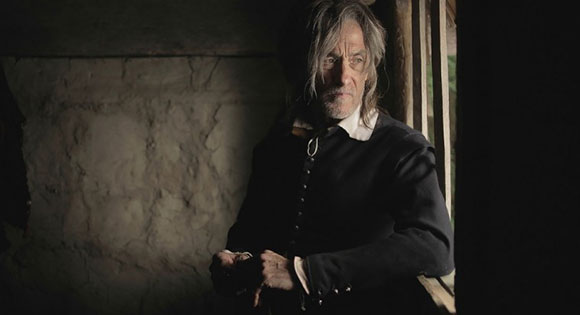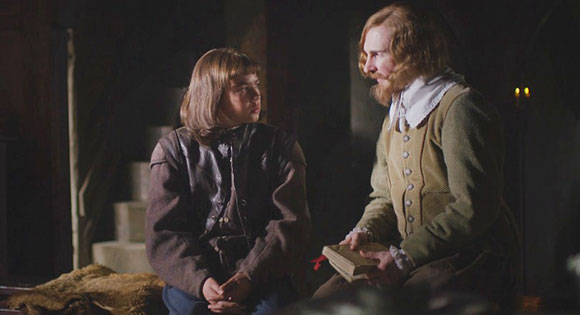The Pilgrims, a new two-hour documentary written and directed by Ric Burns, who collaborated with his brother Ken on the series The Civil War, will premiere on Tuesday, November 24, from 8 – 10 pm ET, on PBS’s American Experience series. It will also be shown on Thanksgiving, November 26. (Check local listings for the times in your area).
This fascinating drama weaves its way between two warped views of the Pilgrims as the founders of America mythologized in an inspiring tale about Thanksgiving and a cynical view of them as creepy religious extremists. The spine of the story is the use of excerpts from the 30-year historical account of the early colony written by William Bradford, governor of the Plymouth Plantation; his presence is effectively evoked by the late actor Roger Rees. The documentary is narrated by Oliver Platt.

The Pilgrims begins in Scooby, England, in the early 17th century where a small band of Protestant evangelical Christians led by minister John Robinson decided to separate themselves from the church of England. They sought to live out lives of purity based on obedience to the Bible and the ideals of simplicity. Facing imprisonment for disloyalty to the king as the head of the Church, they fled to Leiden, Holland, where they stayed for more than a decade. But finding that environment not supportive of their lifestyle, they decided to undertake a daring voyage across the Atlantic Ocean on a ship called the Mayflower. There were 102 passengers, but only about half of them were separatists.
After their arrival in the New World in 1620 they set up a colony on a site where a native tribe, the Wampanoags, had been killed by a plague brought to the area by European fishermen; the Pilgrims built their settlement over their bones. Half their number died during the first winter. In the spring, the sole survivor of the village, Tisquantum, who had been in England during the plague, returned to help the newcomers grew enough food to survive. In the fall their brought in a good harvest, which they celebrated with some of the Wampanoags.

Despite their peace with these neighbors, the pilgrims had little respect for other native tribes. Much to the disapproval to their religious leader back in Holland, John Robinson, they kept a decapitated head of one Indian on a pole in the village as a symbol of their ability to ward off anyone who would attack them.
Ric Burns hopes that this drama will present “the true, unvarnished history of the Pilgrims.” American culture expert Kathleen Donegan adds:
"Because the Pilgrims have been so enshrined in the national imagination, because they've meant so much in what we’ve told ourselves about who we are as Americans, we need to go back and ask questions about why we picked that story.
"There has been a tremendous amount of memory produced around the Pilgrims. But there's also been a lot of forgetting. That memory is very selective. And so to look at what's been remembered, and let that shed light on what’s been forgotten is an important exercise when we’re thinking about something that has been so central to our national imagination."
This engrossing documentary gives us a chance to ask questions about the religious practices of the Pilgrims and the meaning of their emphasis on the separation of church and state. We can also explore the reasons why the national holiday of Thanksgiving has become so drenched with optimism and hope; the first Thanksgiving was probably a time of mourning, as it came after a time when both the Pilgrims and the Indians had lost so many people. A final question revolves around the alliances and conflict between the Native Americans and the Pilgrims, given the separatists' attitudes toward strangers. All three of these issues are relevant to the issues of our times.
